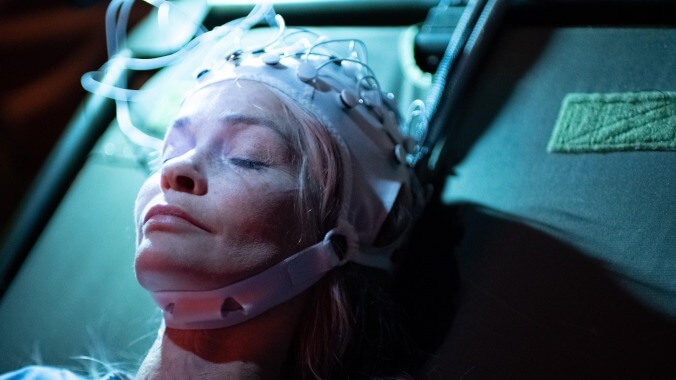Literal snoozefest Demonic is no comeback for District 9 director Neill Blomkamp
Blomkamp's supernatural-horror follow-up to Chappie is no Chappie, either

Photo: IFC Films
Neill Blomkamp is a walking illustration of how precipitously fortunes can rise and fall (and fall, and keep falling) in Hollywood. The South African VFX specialist’s debut feature, District 9, was the type of overnight success we don’t see too much of these days: an original-concept genre picture (what if we did apartheid to aliens that look like jumbo shrimp?) that scored critical adulation, head-spinning box-office returns, and an Oscar nomination for Best Picture, all of which rocketed an unknown rookie filmmaker to the top of the industry’s most-wanted list. Rebottling this lightning proved no easy undertaking, however, as the somehow ambitious and undercooked Elysium put the phrase “sophomore slump” in fans’ minds. After that came the regrettable Die Antwoord showcase Chappie. It made the man, or at least his work, into a memefied punch line, and raised the suspicion that his calling-card triumph might’ve been a right-place-right-time fluke.
Chappie was six years ago, a hiatus Blomkamp spent producing experimental shorts and signing up for Alien and RoboCop sequels that fell through. In terms of showbiz cachet, he’s on the outs but only one good movie away from a potential comeback. That would ideally be his new film Demonic, a smaller-scale horror project doing more with less by leaning on his presumed talents as a technician, freed from the blockbuster bluster gumming up the works. But while Blomkamp does have one impressive CGI trick up his sleeve, he totally drops the ball on the narrative end of things. It’s enough to make a viewer long for the simpler and more immediate pleasures of his filmography, such as being able to point at a screen and say, “That’s Chappie.”
Written in 2019 and shot under the constraints of last summer’s lockdown, Blomkamp’s latest shares the defect of so many COVID-era productions in that it feels thin rather than minimal. Armed with a premise that lends itself to sparse, isolated spaces uncluttered by extras, the writer-director meets the force majeure conditions as well as his modest budget on their own terms instead of trying to conceal them. But the hellacious ordeal faced by Carly (Suits alum Carly Pope) feels underdeveloped, and Blomkamp’s craft isn’t quite virtuosic enough to redeem the clumsiness of his scripting. Our gal’s been summoned by a shady pair of scientists (Terry Chen and character-actor great Michael J. Rogers) to make contact with her comatose estranged mother (Nathalie Boltt) by using an unapproved apparatus that links their slumbering, unconscious minds. So, pretty much the same deal as Tarsem Singh’s The Cell, subbing out the serial killer on the loose for an avian demon tagging along as Carly returns to our dimension.
In the other big point of departure, Blomkamp depicts the mental interiors not as an extravagant fantasy-scape but as real life digitized to resemble a particularly glitchy level of The Sims. Created using a cutting-edge technology known as volumetric capture, these passages render Carly and her farmhouse surroundings as warped virtual approximations of themselves; patches of skin flicker into nothingness, blades of grass stick together, and transparency in the back of her head shows the face backwards from the inside out in an ineffably unsettling effect. Blomkamp’s surreal aesthetic experiment nails the texture of a VR setup in its beta-testing phase; one is reminded that the filmmaker transitioned into directing with a series of short films set in the Halo universe, and that a video game influence has been a hallmark of his work ever since. Without convincing human dialogue to ground it all, however, the innovation comes across unflatteringly as a mere gimmick.
The overall eeriness of the simulation aside, scares are spare. The faint dread takes too long to shift into full fear, and once the homicidal apparition does finally show up, it doesn’t make much of an impression. Blomkamp, a student of action, doesn’t have a strong sense of the rhythms of a solid peekaboo horror set piece, though one possession scene excels solely on the contortions of the stand-in performer skittering around on all fours. Up to the disappointingly inert finale, we can anticipate each move before the film makes it.
Here is a film in which Carly’s BFF clarifies their relationship by announcing “I’m your BFF!” and where conversations end at odd intervals, whenever one participant rules that they “can’t handle this right now.” Though the fraught bond between Carly and her mother has been designed to support the emotional foundation of a cerebral premise, their decades of pent-up animosity have no weight of their own in practice. The two interact like angry casual acquaintances, undermining the “it’s about trauma” rationale that’s provided so many flimsy screenplays an unearned metaphorical heft as of late. Blomkamp’s limits as a storyteller have eclipsed his skills as a conjurer of cinematic tricks for the umpteenth time, leaving us with his dullest and most generic work to date. If there’s a takeaway here, it’s that he may do well to consider directing from a script he hasn’t written himself—to stop tempting his viewers with so much footage of sleeping people.